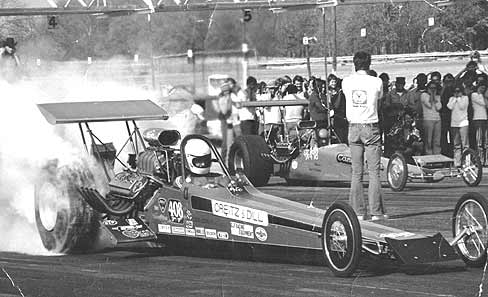| 
BEING FIRST BY BEING
SECOND

DRO file photo
7/8/05
 know I just wrote about something that happened at Southern
California’s wonderful Ontario Motor Speedway, Ronnie
Sox and “Butch” Leal’s Pro Stock twist at
the 1971 NHRA Supernationals. We all have our prejudices when
in the various items drag racing. When it comes to national
event race sites, the greatest run of performances happened
at Ontario between the years 1972 through 1975. The Sox-Leal
deal was just a great race, but not what one could call traffic-stopping
numbers.
know I just wrote about something that happened at Southern
California’s wonderful Ontario Motor Speedway, Ronnie
Sox and “Butch” Leal’s Pro Stock twist at
the 1971 NHRA Supernationals. We all have our prejudices when
in the various items drag racing. When it comes to national
event race sites, the greatest run of performances happened
at Ontario between the years 1972 through 1975. The Sox-Leal
deal was just a great race, but not what one could call traffic-stopping
numbers.
If you’ve waded in the water here and other places
where I’ve put my paw print, you know that the wobbly
West Coast windbag has inundated you with Ontario opuses.
However, I’m not sure about this one. Most of the focus
has been on the incredible 1975 race where Garlits’
Top Fuel 5.63, 250.69 set the class standard for the next
seven years, and Don Prudhomme’s 5.98 became the first
run in that zone, but there were others and the one here is
the 1972 race where the first five-second Top Fuel charge
came on a losing run.
ADVERTISEMENT
 |
|
To
this point, Ontario had not given indications of what we would
see at the 1972 Supernationals. Going into the event, the billard
table smooth track had an elapsed time record of 6.53, all things
considered, a good, middle of the pack score. When the event
came to a dramatic close, the mark had peeled off a staggering
.56 digits!
With the luxury of 20-20 historical hindsight, 1972 proved
to be a bellweather year. On January 1 of that season, the
best Top Fuel elapsed time was a 6.21 turned by Garlits at
the ’71 Indy event. The new year was only a couple of
weeks old when Don Prudhomme and John Wiebe produced side-by-side
6.17s at the Lions NHRA Grand Premiere. A few weeks later
in tire tests also at Lions, Clayton Harris quickened the
pace with a 6.16 in Jack McKay’s New Dimension dragster,
and by mid-March Garlits clocked a 6.15 in winning the NHRA
Gatornationals. With the bell ready to ring for the ’72
Supernationals, Jerry Ruth held the quickest elapsed times
with 6.06 and 6.07 laps at Indianapolis.
Anybody with a sense of history knew what was coming, the
five-second zone. Only issue was when. Frankly, as good as
the ’72 season, the much-anticipated first five did
not appear as a set deal. Ontario was professional in every
detail and likely could produce 6.1s, but 6.0s only as an
extreme longshot and 5.9s as a virtual impossibility. The
only other race on the calendar was the NHRA World Finals
at Amarillo Dragway, which had all the bite of Homer Simpson’s
father. In other words, Ontario or bust.

|
